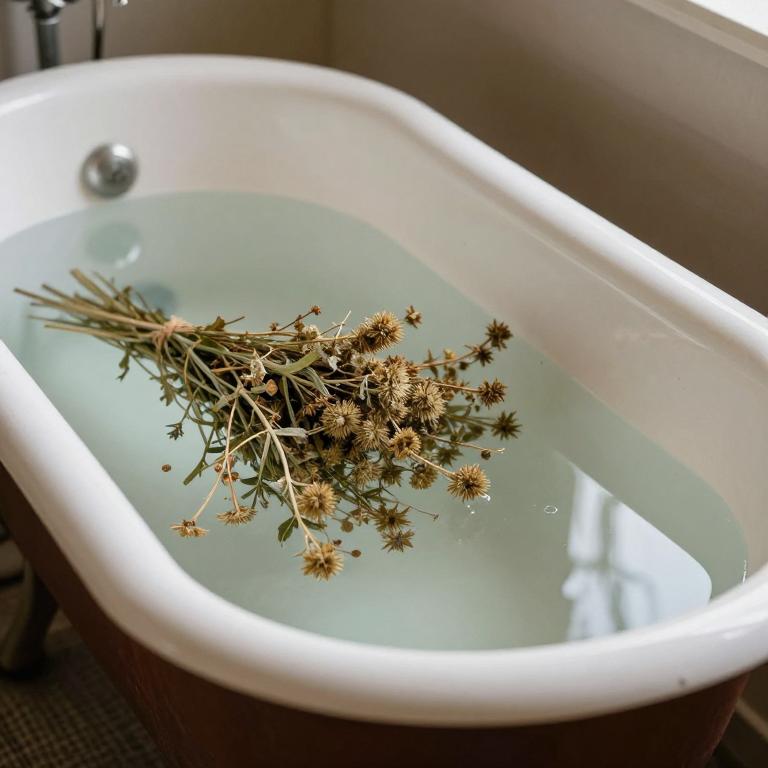10 Best Herbal Baths For Joint Pain

Herbal baths for joint pain involve soaking in warm water infused with natural herbs known for their anti-inflammatory and pain-relieving properties.
Common herbs used include lavender, eucalyptus, ginger, and turmeric, each offering unique benefits for soothing aching joints and muscles. These baths can help reduce inflammation, improve circulation, and relax tense muscles, providing relief from conditions like arthritis and rheumatism. The warmth of the water enhances the absorption of herbal compounds through the skin, promoting a deeper therapeutic effect.
Regular use of herbal baths can be a gentle, holistic approach to managing joint discomfort and supporting overall well-being.
Table of Contents
- 1. Field horsetail (Equisetum arvense)
- 2. St. john's wort (Hypericum perforatum)
- 3. Yarrow (Achillea millefolium)
- 4. Salvia (Salvia officinalis)
- 5. Stinging nettle (Urtica dioica)
- 6. Blessed thistle (Cnicus benedictus)
- 7. Ginger (Zingiber officinale)
- 8. Peppermint (Mentha piperita)
- 9. Rosemary (Rosmarinus officinalis)
- 10. Turmeric (Curcuma longa)
1. Field horsetail (Equisetum arvense)

Equisetum arvense, commonly known as field horsetail, has been traditionally used in herbal baths to alleviate joint pain due to its high concentration of silica and other minerals.
The silica content in horsetail is believed to support the repair and strengthening of connective tissues, which can be beneficial for individuals suffering from conditions like arthritis. When used in warm water baths, the plant's compounds are thought to be absorbed through the skin, reducing inflammation and improving circulation in the affected areas. Many people report a soothing effect on their joints after regular use of horsetail baths, although it is important to consult with a healthcare professional before starting any new herbal treatment.
While not a substitute for medical care, equisetum arvense herbal baths may offer a natural complementary approach to managing joint discomfort.
2. St. john's wort (Hypericum perforatum)

Hypericum perforatum, commonly known as St. John's wort, is traditionally used in herbal baths to alleviate joint pain due to its anti-inflammatory and analgesic properties.
When infused into warm water, the active compounds in St. John's wort, such as hypericin and hyperforin, can be absorbed through the skin, providing localized relief. These baths are often recommended for individuals suffering from arthritis or muscle aches as a natural alternative to pharmaceutical treatments. The soothing warmth of the water enhances the therapeutic effects, promoting relaxation and reducing stiffness in affected joints.
However, it is important to consult with a healthcare provider before using St. John's wort, as it may interact with certain medications.
3. Yarrow (Achillea millefolium)

Achillea millefolium, commonly known as yarrow, has been traditionally used in herbal baths to alleviate joint pain due to its anti-inflammatory and analgesic properties.
When infused into warm water, yarrow can help soothe inflamed joints and reduce stiffness, making it a popular remedy for conditions like arthritis. The essential oils and compounds in yarrow, such as chamazulene and azulene, contribute to its soothing effects on the skin and underlying tissues. Herbal baths with yarrow can also promote relaxation and improve circulation, enhancing overall joint health.
However, it is important to consult with a healthcare provider before using yarrow baths, especially for those with sensitive skin or existing medical conditions.
4. Salvia (Salvia officinalis)

Salvia officinalis, commonly known as sage, has been traditionally used in herbal baths to alleviate joint pain due to its anti-inflammatory and analgesic properties.
When infused into warm water, sage leaves release essential oils and compounds such as thujone and camphor, which can help reduce swelling and soothe sore joints. These baths are believed to improve circulation and provide a calming effect, making them a popular natural remedy for conditions like arthritis and muscle aches. To prepare a sage bath, simply steep fresh or dried sage leaves in hot water for several minutes before adding the infusion to a warm bath.
Regular use of sage herbal baths may offer long-term relief and support overall joint health when combined with other holistic treatments.
5. Stinging nettle (Urtica dioica)

Urtica dioica, commonly known as stinging nettle, has been traditionally used in herbal baths to alleviate joint pain due to its anti-inflammatory and analgesic properties.
When prepared as a bath, the leaves of Urtica dioica can be steeped in warm water to create a soothing soak that helps reduce swelling and discomfort in affected joints. The high concentration of silica and other minerals in nettle may support tissue repair and improve circulation, enhancing the therapeutic effects of the bath. Regular use of stinging nettle baths can provide long-term relief for conditions such as arthritis and rheumatism.
However, it is important to ensure the water is not too hot and to consult with a healthcare provider before beginning any new herbal treatment.
6. Blessed thistle (Cnicus benedictus)

Cnicus benedictus, also known as blessed thistle, has been traditionally used in herbal baths to alleviate joint pain due to its anti-inflammatory and soothing properties.
When infused into bathwater, the essential oils and phytochemicals from the plant can help reduce swelling and irritation in the joints, promoting relaxation and ease of movement. This herbal remedy is particularly beneficial for individuals suffering from conditions like arthritis or rheumatism, offering a natural alternative to conventional treatments. The warm water enhances the absorption of the plant's compounds, allowing for deeper penetration into the skin and joints.
Overall, Cnicus benedictus herbal baths provide a calming and therapeutic experience that supports joint health and comfort.
7. Ginger (Zingiber officinale)

Zingiber officinale, commonly known as ginger, has been traditionally used in herbal baths to alleviate joint pain due to its anti-inflammatory and analgesic properties.
When added to warm water, ginger helps to increase blood circulation to the affected areas, promoting faster healing and reducing stiffness. The active compounds in ginger, such as gingerols and shogaols, are believed to inhibit inflammatory responses in the body, offering relief from conditions like arthritis and muscle aches. Herbal baths with ginger can be a soothing and natural alternative to pharmaceutical treatments, providing a holistic approach to pain management.
Regular use of ginger-infused baths may help reduce chronic joint discomfort and improve overall joint function.
8. Peppermint (Mentha piperita)

Mentha piperita, commonly known as peppermint, has been traditionally used in herbal baths to alleviate joint pain due to its cooling and anti-inflammatory properties.
When added to warm water, peppermint essential oil or fresh leaves can help soothe inflamed joints and reduce muscle tension. The menthol in peppermint is known to stimulate blood circulation, which may enhance the healing process in affected areas. A regular peppermint herbal bath can provide relief from conditions such as arthritis and rheumatism by easing discomfort and promoting relaxation.
However, it is important to dilute the essential oil properly and consult a healthcare provider before using it, especially for those with sensitive skin or existing health conditions.
9. Rosemary (Rosmarinus officinalis)

Rosmarinus officinalis, commonly known as rosemary, has been traditionally used in herbal baths to alleviate joint pain due to its anti-inflammatory and analgesic properties.
When infused into warm water, rosemary essential oil or dried leaves can help soothe inflamed joints and reduce stiffness, promoting relaxation and improved circulation. The aromatic compounds in rosemary may also have a calming effect, enhancing the overall therapeutic experience of the bath. Regular use of rosemary herbal baths can be a natural and complementary approach to managing symptoms of arthritis and other joint-related conditions.
However, it is important to consult with a healthcare professional before incorporating such treatments into a pain management regimen.
10. Turmeric (Curcuma longa)

Curcuma longa, commonly known as turmeric, has been traditionally used for its anti-inflammatory and analgesic properties, making it a popular choice for herbal baths aimed at alleviating joint pain.
When infused into warm water, curcuma longa can create a soothing bath that helps reduce swelling and stiffness in the joints. The active compound, curcumin, is believed to inhibit inflammatory pathways in the body, providing natural relief for conditions like arthritis. To prepare a turmeric bath, a few tablespoons of turmeric powder can be added to warm water, allowing the skin to absorb its beneficial properties.
Regular use of such baths may complement other treatments and offer a holistic approach to managing joint discomfort.